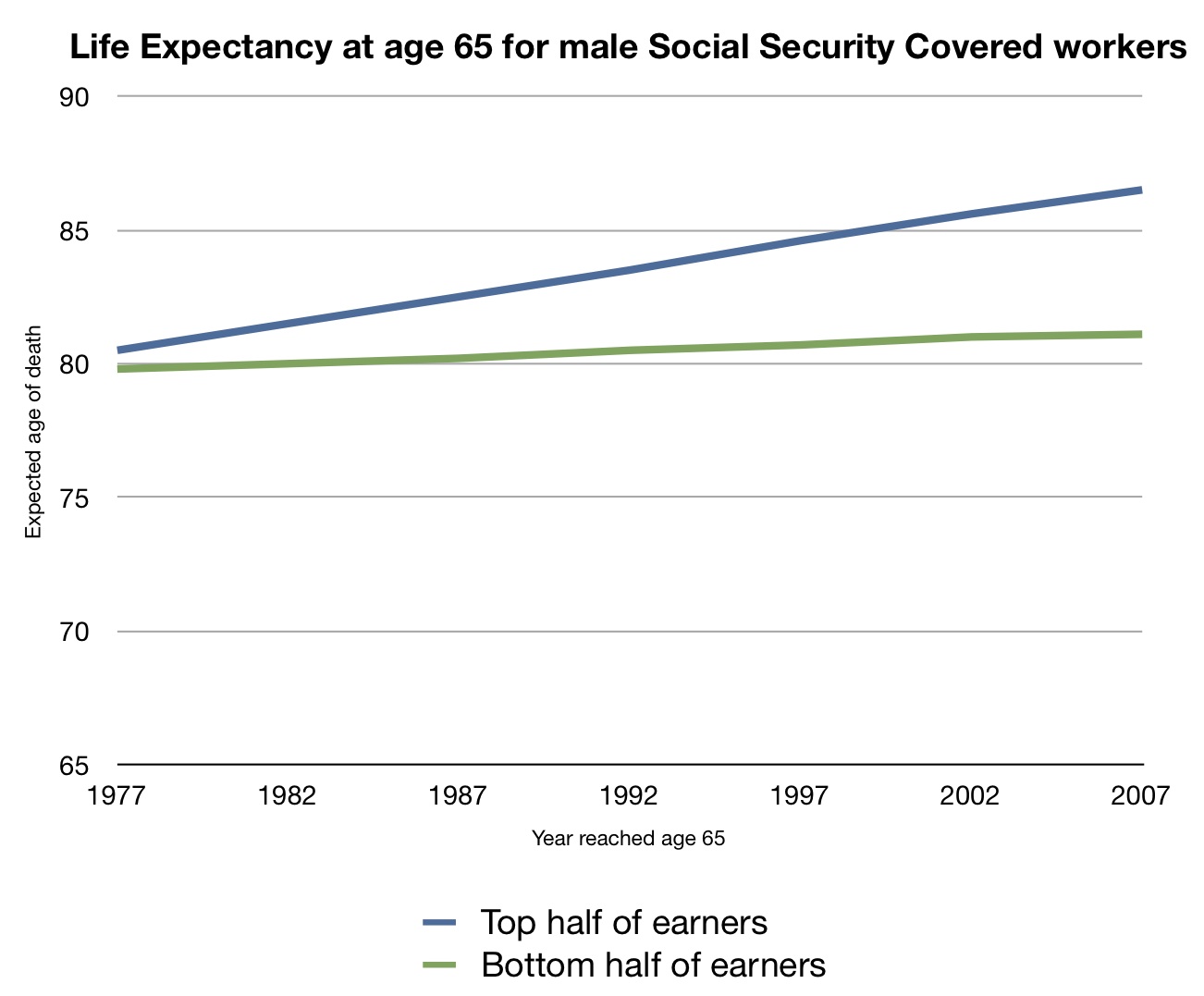Ryan Grim does everyone a favor and points out that Alan Simpson, one of the supposed luminary atop the two-head Bowles-Simpson monster, has a bit of a reality problem. This time, it comes from the actual expected life spans of most Americans. As he writes,
HuffPost suggested to Simpson during a telephone interview that his claim about life expectancy was misleading because his data include people who died in childhood of diseases that are now largely preventable. Incorporating such early deaths skews the average life expectancy number downward, making it appear as if people live dramatically longer today than they did half a century ago. According to the Social Security Administration's actuaries, women who lived to 65 in 1940 had a life expectancy of 79.7 years and men were expected to live 77.7 years.It's worth referring to some of the data that Simpson is aggressively trying to refute. Few would disagree that life expectancy for those people that reach sixty-five has changed in any meaningful way, especially for the poor that actually depend on social security. As Aaron Carroll shows, almost all gains in life expectancy come for those at the upper end of the income spectrum.
"If that is the case -- and I don’t think it is -- then that means they put in peanuts," said Simpson.
Simpson speculated that the data presented to him by HuffPost had been furnished by "the Catfood Commission people" -- a reference to progressive critics of the deficit commission who gave the president's panel that label.
Told that the data came directly from the Social Security Administration, Simpson continued to insist it was inaccurate, while misstating the nature of a statistical average: "If you’re telling me that a guy who got to be 65 in 1940 -- that all of them lived to be 77 -- that is just not correct. Just because a guy gets to be 65, he’s gonna live to be 77? Hell, that’s my genre. That’s not true," said Simpson, who will turn 80 in September.
It's even more weird to be considering this a major demographic change, or even a demographic problem, because we've known about the baby boomers for an incredibly long time. The HuffPost article points out that Social Security's demographic problems were identified in 1983, and the government was aware of changing demographic trends as far back as 1946. The cost side of changing demographics was fully accounted for in the '83 recommendations of the Greenspan commission.
So to reiterate, no one was surprised by changing demographics, and in fact, nothing about Social Security's "problems" can be attributed to demographic change. Instead, you seem to have a much different and unanticipated problem. Exploding inequality has seriously hurt the amount of revenues that can be generated. Everyone should know that the FICA tax that funds our social programs is capped at 110,000 dollars; i.e. money earned after that point is no longer taxed. This was recently pointed out by the Congressional Budget Office.
So to reiterate, no one was surprised by changing demographics, and in fact, nothing about Social Security's "problems" can be attributed to demographic change. Instead, you seem to have a much different and unanticipated problem. Exploding inequality has seriously hurt the amount of revenues that can be generated. Everyone should know that the FICA tax that funds our social programs is capped at 110,000 dollars; i.e. money earned after that point is no longer taxed. This was recently pointed out by the Congressional Budget Office.
As wages have remained stagnant since the beginning of the 1980s, FICA has lost the ability to generate the kinds of revenue that the Greenspan commission anticipated. Simply removing the cap would go a long way towards eliminating the problem. This completely eliminates the need for means testing the program. If you want to reduce the proportional benefits received by the rich, who most would argue don't need social security, just have them pay more into the system.
The current attack on social security really isn't anything new than the greater trend of reduced transfer programs over the last 30 years. Even as income inequality reaches historically unprecedented levels, we have been doing even less to try and counteract it.
Policies that redistribute income have been under attack for a very long time. And there's no surprise where the motivation comes from. I'll let Lee Atwater conclude this little piece,
You start out in 1954 by saying, “Nigger, nigger, nigger.” By 1968 you can’t say “nigger”—that hurts you, backfires. So you say stuff like, uh, forced busing, states’ rights, and all that stuff, and you’re getting so abstract. Now, you’re talking about cutting taxes, and all these things you’re talking about are totally economic things and a byproduct of them is, blacks get hurt worse than whites.… “We want to cut this,” is much more abstract than even the busing thing, uh, and a hell of a lot more abstract than “Nigger, nigger.”


No comments:
Post a Comment